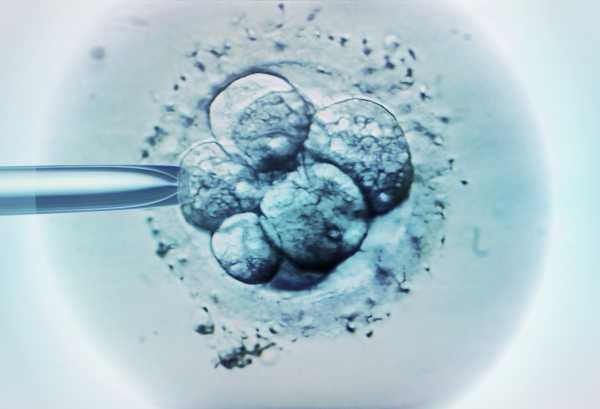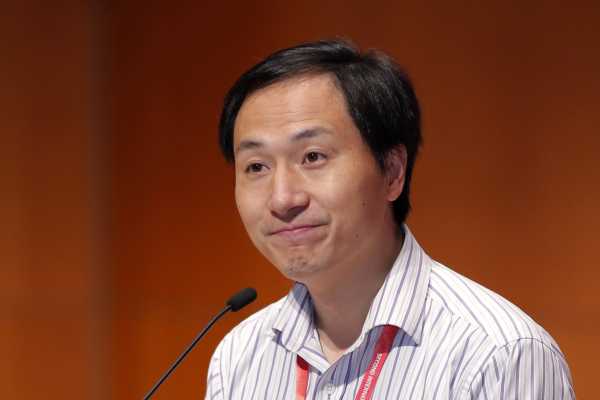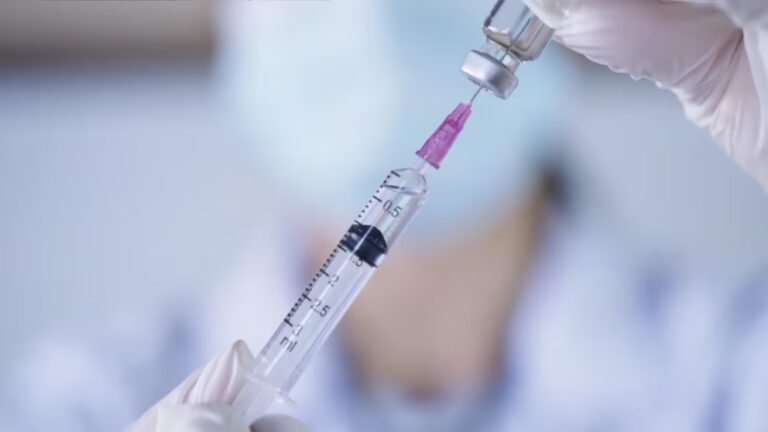
The possibility of “CRISPR babies” became real last week, when a Chinese scientist stunned the world by announcing he’d used the gene-editing technology to alter the embryos of two baby girls. His stated aim: to eliminate their risk of HIV infection.
The scientist, He Jiankui, was apparently working alone. He took leave from his university, Southern University of Science and Technology in Shenzhen, to conduct his experiment in secret — breaking Chinese law and shirking the scientific consensus that CRISPR isn’t ready for tinkering in babies.
The backlash against the experiment was swift. Feng Zhang, a member of the Broad Institute of MIT and Harvard and a CRISPR co-inventor, called for a moratorium on gene-edited babies. Francis Collins, the director of the National Institutes of Health, said the experiment was “profoundly disturbing and tramples on ethical norms.”
He is currently under investigation by his university and the Shenzhen City Medical Ethics Expert Board. And already, as more details about his experiment have emerged, it’s become clear that it was even more flawed than it originally seemed. The major issue: He subjected the girls to a risky and unproven intervention for no clear benefit or medical need. (They were not at immediate risk of HIV, and we have much safer alternatives than gene editing that effectively drive down risk.)

Meanwhile, another nagging question has lingered: Are there more scientists out there using CRISPR to tweak genes in embryos intended for pregnancy — and could clinics offering to CRISPR babies show up in the US any time soon?
In an article in Stat this week, the University of California Davis School of Medicine stem cell biologist Paul Knoepfler argued that we will see IVF clinics using CRISPR because we’ve already seen stem cell clinics offering non-FDA approved therapies proliferate.
There is no US state or federal law prohibiting germline (the DNA of sperm, eggs, and embryos that could be inherited by future generations) editing in humans. But the FDA has taken the view that putting a genetically modified embryo into a human is the same as introducing a new drug or biological product — and in 2015, Congress mandated that the FDA isn’t even allowed to accept new drug applications for clinical research involving genetically-modified embryos. So anyone who undertakes this research would be doing so without the agency’s approval, and if caught, would potentially face jail time and a $100,000 fine.
Just because it’s illegal, however, doesn’t mean people won’t do it, Knoepfler argues. Hank Greely, a Stanford law professor who has been studying CRISPR, meanwhile takes the opposite view that we shouldn’t expect CRISPR babies in the US anytime soon.
Here are their arguments for and against the imminent arrival of CRISPR in IVF clinics, as told to me. (They have been lightly edited for brevity and clarity.)
Paul Knoepfler: the case that CRISPR clinics will soon pop up in the US
I’ve been working on stem cells for almost 20 years. At some point in the US, there weren’t any stem cell clinics. Then, a little more than 10 years ago, someone had the idea to start selling unproven stem cells here and we think there are now 1,000 clinics in the US, and the FDA is struggling to control them.
So I’ve wondered: Could we be looking back 10 years from now and thinking, gee, it’s 2028, and there are an increasing number of clinics saying, “We’ll CRISPR your future kids.”
I think it’s possible.
It’d be difficult for FDA to prevent anyone from doing human reproductive CRISPR experiments. If someone wanted to, and then next year or the year after there was an American [version of] He Jiankui, and this person said we [made a CRISPR baby], I suppose FDA could try to crack down. But it’d be a lot tougher than people might realize.
For one thing, they’d have to be reactive to it after it’s already happened. In a similar case that already happened, a fertility doc made a three-parent baby and all the FDA did was send him a warning a year later.
The FDA says an Investigational New Drug [IND] application would be required [to CRISPR a baby], and the federal government has said the FDA can’t consider an IND for gene editing. But someone could go ahead anyway and argue an embryo is not something the FDA should regulate as a drug. They could invoke the “rights” of parents to want to avoid a severe disease.
So things could get complicated, and end up in court. With germline CRISPR, I’m also concerned that it wouldn’t be that big a deal for someone to try it within an existing IVF clinic and keep it secret from others.
Remember the case of the fertility doctor who secretly used his own sperm to make a large number of babies? You don’t have to start a new clinic because CRISPR is so ubiquitous and straightforward to try. You might not be able to get it to work perfectly if you’re not an expert, but you could try it and potentially cause a lot of harm.
Plus, a lot of people, particularly in the fertility industry, aren’t really afraid of the FDA. They might be more concerned with state medical boards taking their license away. But state medical boards have been passive about [stem cell clinics] as well.
What would FDA be able to do after the fact? Especially if the reproductive part — the embryo production — isn’t done in the US. You could either implant it in the US or go outside the FDA jurisdiction and implant it.
The bottom line is that this would be tough to prevent and then complicated to deal with after the fact.
Hank Greely: why we won’t see CRISPR clinics in the US any time soon
The more complicated the medicine required to do something, the less likely it is. And doing CRISPR on babies is complicated.
In order to use CRISPR on an embryo for pregnancy, you need an IVF clinic. And IVF clinics have a lot to lose. They have to keep customers. They have a reputation.
Their physicians have medical licenses. Doing something illegal in the US — like distributing a new drug without FDA authorization — is going to be really bad for an IVF clinic.
At an IVF clinic, you’d also need a reproductive endocrinologist willing to break the law, and an embryologist willing to break the law, as well as a molecular biologist. And they’d have to advertise to patients while trying to keep it secret.
If some doctor wants to open something he calls a stem cell clinic, he doesn’t have to put in the same kind of investment.
But the bigger difference between unauthorized stem cell clinics and potential CRISPR clinics is political: There are a whole bunch of stem cell clinics operating in the US that the FDA can and should close down but hasn’t. And there are big political differences between competent adults deciding to use stem cells and CRISPRing babies. One is that conservative Republicans tend to like adults making their own choices, and people making money.
On the other hand, Republicans don’t like CRISPRed babies. Politicians don’t like CRISPRed babies because their constituents are largely very nervous about CRISPRed babies. As a result, Federal law already prohibits using CRISPR to make babies.
Somebody could break the law here. Murder has been illegal for a long time — but murder still happens.
As for other countries, I don’t think we’ll see them pop up in China. The Chinese government is coming down hard on He Jiankui. But a small, less-developed country, preferably in a nice place to visit — Antigua? It could happen.
Conclusion: ready for this?
There is no shortage of examples in medicine of people exploiting the desperation of patients, offering them unproven and risky treatments. According to Knoepfler, doing so with CRISPR isn’t all that far-fetched — while Greely makes a strong case that it’s both politically and logistically infeasible.
Whatever side you fall on, it’s time for scientific groups and regulatory agencies to think about whether the laws, policies, and regulations we have in place are ready for this.
Simply cracking down, though, isn’t necessarily the best way forward, said Jeffrey Kahn, director of the Johns Hopkins Berman Institute of Bioethics. “There’s a relationship between prohibition and how much rogue activity you get in other places. So tight control and oversight but permissive progress is a much better path.”
He pointed to the UK’s example, where the government oversees the creation and use of human embryos, a strategy that’s been used since the early days of IVF and now guides mitochondrial replacement therapy. There, scientists can experiment with gene editing in human embryos “but under strict control and licensure, and only in a few places at a time.”
In the New York Times, science journalist Carl Zimmer made a similar argument, noting that “genetically modified people” are already among us since US doctors used an early version of mitochondrial replacement therapy to swap out defective mitochondrial DNA in the eggs of women undergoing IVF in the 1990s. According to Zimmer, what we need now is a clear-headed debate about the pros and cons of CRISPR instead of a reactionary ban.
No matter what path the US government takes, however, there are going to be more He Jiankui’s out there — in China, Antigua, or even right here — who decide to forge ahead despite the risks.
Sourse: vox.com






